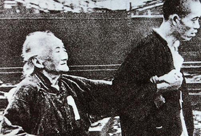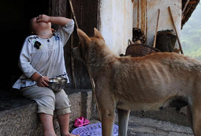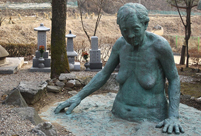 Martenitsa adds glamour to Bulgarian Embassy
Martenitsa adds glamour to Bulgarian Embassy
 Mysterious 'Dolan Tribe' in Xinjiang
Mysterious 'Dolan Tribe' in Xinjiang
 This is Shanghai
This is Shanghai
 Female attendants serving 'two sessions'
Female attendants serving 'two sessions'
 The many tears of DiCaprio
The many tears of DiCaprio
 Dan Dan's bittersweet opera life
Dan Dan's bittersweet opera life
 A dream wedding for a girl suffering from cancer
A dream wedding for a girl suffering from cancer
 Old photos of Anti-Japanese War (1937-1945)
Old photos of Anti-Japanese War (1937-1945)
 This is Beijing – Nanluoguxiang
This is Beijing – Nanluoguxiang
BEIJING -- More than a year after his Nobel win that rocked the country, Chinese writer Mo Yan is still ill at ease with the media attention.
"I hope you could accurately report my speech. Don't invent sensational headlines to mislead readers," Mo, the 2012 Nobel literature laureate whose words have been misinterpreted on several occasions, cautioned half-jokingly as he shared his proposal during a discussion at the ongoing annual session of the political advisory body.
This is the second year he has served as a political advisor. In 2013, Mo, whose pen name means "don't speak," remained largely silent during the political event despite his Nobel fame.
His proposal this year called for more attention to families with only one child, particularly those who had lost their only child, based on "a year of research and thoughts."
While China's one-child policy seems irrelevant to Mo's job on first sight, the 59-year-old writer is no stranger to the topic.
In his latest novel, "Frog," he depicts a rural midwife who has carried out thousands of abortions to strictly implement the country's birth control policy.
As a writer who works with "hallucinatory realism merged with folk tales, history and the contemporary," Mo haunted his heroine with delusions that she was trapped by frogs whose croaks symbolized the cries of the babies she had aborted.
Instead of dwelling on the controversy of the policy like he did in the novel, Mo sought to remedy the negative consequences of the rule in his proposal submitted to the National Committee of the Chinese People's Political Consultative Conference.
He acknowledged that the one-child policy helped contain rapid population growth at a time when economic progress was key, but it also created financial stress for aging parents, as the elderly traditionally rely on their children to support them.
In many areas, one-child families get a monthly allowance of a mere 5 yuan (0.8 U.S. dollars) under a policy established in the early 1980s, Mo noted in his proposal, a sum that he said was too low to cover costs.
For those who have lost their only child, things are even worse.
In Weifang city in east China's Shandong Province, Mo's hometown, there are more than 3,000 people who have lost their only child.
"You can imagine. How can a rural couple in their 60s spend their lonely life?" the novelist said.
He proposed that parents who have lost their only child should be included in the government pension and medical insurance system and that financial support should be improved.
"When they lose their ability to work, they should enjoy the same wage and treatment as government civil servants," he said.
Along with his proposal, Mo also shared his opinions on some widely-watched social issues, including corruption and moral collapse, during the ongoing session.
"For a writer, corruption is a matter of humanity -- the conflicts between desire and laws, morality and the social system," Mo said in a 30-minute interview with the Procuratorial Daily, where he worked for ten years.
People need external strength to help rein in their innate desires, and that is something they can find in literature and books, Mo said.
"I believe that, pooled together, the good will of the masses will form into an insurmountable moral strength that can help check the evil and right the wrongs," he said.
 Chaihe village, pure and peaceful fairyland in snow
Chaihe village, pure and peaceful fairyland in snow Belgians warmly welcome arrival of China's giant pandas
Belgians warmly welcome arrival of China's giant pandas Female marines receive tactical training in NW China
Female marines receive tactical training in NW China Blood memory: Nanjing Massacre in 1937
Blood memory: Nanjing Massacre in 1937 Top 10 pure beauties in showbiz
Top 10 pure beauties in showbiz British WWII veteran: I can't forgive Japan
British WWII veteran: I can't forgive Japan Tongban's dream of prosperity
Tongban's dream of prosperity Chinese frigate Yancheng holds drills in Mediterranean Sea
Chinese frigate Yancheng holds drills in Mediterranean Sea A visit to comfort woman's home in South Korea
A visit to comfort woman's home in South Korea Fairyland? Qingdao in sea of clouds
Fairyland? Qingdao in sea of clouds Top 10 most handsome faces in Asia in 2013
Top 10 most handsome faces in Asia in 2013 Female celebs with beautiful long legs
Female celebs with beautiful long legs Cat 'guardians' in Forbidden City
Cat 'guardians' in Forbidden City Large numbers of ancient coins excavated in Inner Mongolia
Large numbers of ancient coins excavated in Inner Mongolia Leisurely life beneath Zhonggulou, where time travels slower
Leisurely life beneath Zhonggulou, where time travels slowerDay|Week|Month